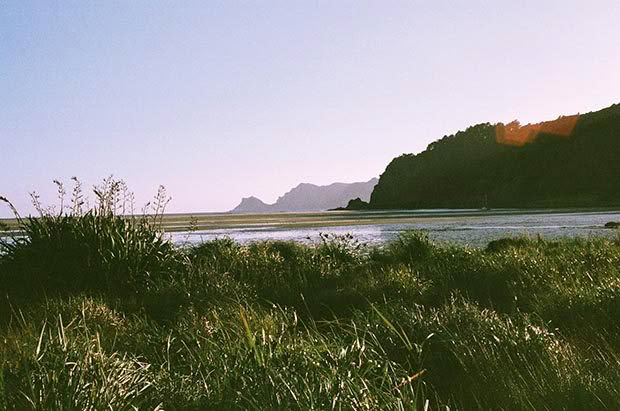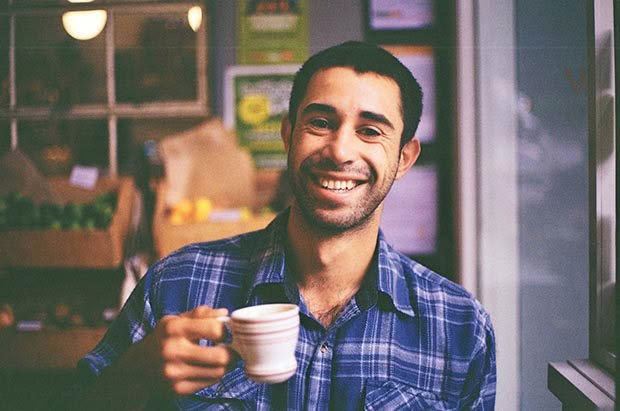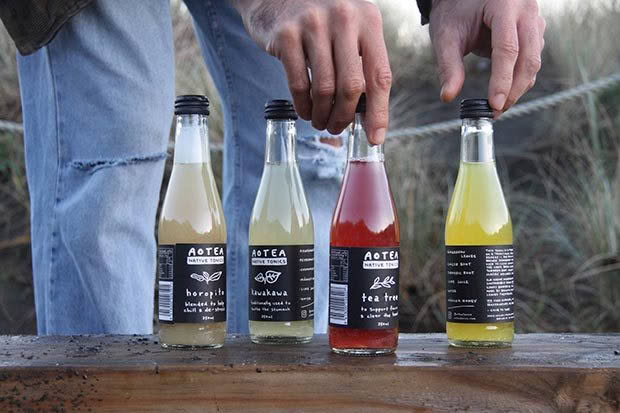Great Barrier Island herbal tonic business, Aotea, in growth mode

A young entrepreneur from Great Barrier Island is tasting success from his own bitter medicine
Words: Emma Rawson
When Tama Toki was growing up on Great Barrier Island, his kuia (grandmother) forced him to swallow a cup of ghastly kūmarahau tonic every morning. He loathed the sour taste of the native flower, which is a traditional Māori remedy for coughs and respiratory illnesses.
Winters on the island without mains electricity and water were harsh, and native herbs were a part of his whanau’s daily life, supplementing the infrequent supply of pharmaceuticals from Auckland.
THE NUMBERS
$300,000 turnover, year on year
100% growth, year on year
300 retailers stocking Aotea products
150,000 bottles sold per year
5000 units of skin care
Fast-forward 20 years and Tama, 26, makes his crust from the herbal concoctions he couldn’t stomach as a kid. The former Auckland athletics champ has traded in a law career to work full-time on his Auckland-based native herb health-tonic firm, Aotea, with business partner Simon Stanley Harris.
The main herbal ingredients are sourced from Tama’s family land on Great Barrier Island. The business, launched only 18 months ago at the La Cigale Markets in Parnell, now produces 150,000 bottles a year and is sold nationwide through more than 300 cafés and supermarkets.

The Parnell markets proved effective for exploring demand.
“The first batches tasted bitter and were only popular with health nuts so we refined our recipe to blend native herbs with well-known ingredients.
“People haven’t heard of kūmarahau, but they have heard of turmeric and ginger. Those ingredients complement the health benefits of the native herb and also help the drink taste more appealing.”
Aotea’s next step was a distribution partnership with All Good Organics, makers of the Karma Kola range. Aotea has been able to piggyback off All Good Organics’ existing retail relationships and has fridge space next to its products.
Outsourcing the production to Pure Bottling in Tauranga has also allowed the firm to grow quickly and solve any bottling issues as they arise.
ELEVATOR PITCH
The Aotea range of tonics contains New Zealand botanical ingredients kūmarahau, horopito, kawakawa and manuka leaf, traditionally used in the relief of symptoms such as respiratory illness, fevers and stomach ailments. Horopito is believed to have antimicrobial qualities, and kūmarahau is revered for its anti-inflammatory benefits. The company also makes small quantities of skin care and branded manuka honey.

TAILWINDS
Demand has been steady and by outsourcing the manufacturing and distribution, the company has kept its capital expenditure low.
Aotea is a two-man operation and has funded its growth through revenue. If a quick expansion is required, the twosome may need capital and could look at sourcing native herbs from locations beyond Great Barrier Island.
“We’d like to build a sustainable business from Great Barrier, but there are only so many natural resources available.”
HEADWINDS
Although they have had glowing reviews from customers, there is only anecdotal evidence about the health benefits of the products. Sourcing credible research will be essential for Aotea’s growth, so the company is applying for research funding from Callaghan Innovation and the government-owned Plant & Food Research.
A United States pharmaceutical company is already exploring the benefits of kawakawa, says Tama.
“In New Zealand, we need to protect the intellectual property of our native plants. There are examples overseas of pharmaceutical companies snapping up the IP of indigenous medicines such as kava in Hawaii.”
WHAT’S NEXT?
Tama recently visited Singapore and Malaysia to explore the potential of these markets, a trip organized by the Asia New Zealand Foundation on behalf of MFAT.
“In Singapore, they liked the product and we’re looking seriously at exporting, but our game plan is to solidify our presence in the New Zealand market first.”
LESSON
‘You can’t get past hard work at the beginning and it’s important to keep up the momentum. We put in long hours, and we’re still doing a lot of door-knocking’
Love this story? Subscribe now!
 This article first appeared in NZ Life & Leisure Magazine.
This article first appeared in NZ Life & Leisure Magazine.
